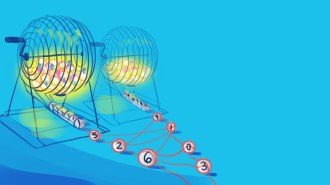Counting how votes count
A rational person will vote, economists show, as an act of altruism.
- More than 2 years ago
Voting can look like a bum deal. After all, odds that your one vote will determine the outcome of the presidential election are extraordinarily low. Even if the election makes a very big difference to you personally — say, you’ll be $20,000 richer if your candidate gets elected — the chance that your vote will make the difference is so low that the expected payoff for voting is minuscule. Factor in the time and trouble, and why would anyone bother?
Indeed, some economists have concluded that, strictly speaking, voting in large elections isn’t rational. People do it, economists say, because they’re confused or irrational — or, perhaps, because it makes them feel good.
Not so fast, says a team of economists and statisticians who have done a new analysis of voting. Factor in the good to everyone, and voting becomes a rational act after all. For example, they say, suppose that the election will provide the benefit of just $100 to each person in the United States. The U.S. population is 300 million people, so that gives a benefit of $30 billion. If you care about the benefit to everyone, not just yourself, then that starts looking pretty good.
Of course, your vote will make the difference only very rarely, say one time in 10 million, so it isn’t reasonable to expect that your trip to the polls will actually bring in $30 billion. Economists deal with this kind of thing by computing the “expected payoff.” Say, for example, that I offer to flip a coin and pay you $200 if it comes up heads and nothing if it comes up tails. If we flipped the coin a bunch of times, you’d expect, on average, to win half the time, for an expected payoff of $100. Similarly, if there’s a one-in-10-million chance that your vote will net the U.S. population $30 billion, your expected payoff for going to the polls would be ten millionth of 30 billion dollars, or $3,000. Pretty good payoff for a brief errand.
“It’s like you’re buying a lottery ticket with a one in ten million chance to change the world,” says Andrew Gelman of Columbia University, author of Red State, Blue State, Rich State, Poor State. “That’d be worth a lot to me.”
Gelman and his colleagues’ argument hinges on the precise balance between a huge number — the payoff to the whole country if one’s preferred candidate wins — and a tiny number — the chance of one’s vote being decisive. Gelman, Aaron Edlin of the University of California, Berkeley and Noah Kaplan of the University of Houston imagined what happens as the population gets bigger. The possible payoff, of course, will go up, while the chance of your vote being decisive goes down. The key question is how fast the two grow and shrink. If the payoff gets bigger at least as fast as the chance of casting the decisive vote gets smaller, voting may be rational after all.
While the payoff to the country is impossible to calculate precisely, it’s clear that it will be proportional to the population. The chance of one’s vote being decisive is trickier. The researchers used a simple model, which they verified with data from past elections. They assumed that in a close election, each candidate will receive somewhere between 47 percent and 53 percent of the vote, with roughly equal likelihood anywhere within that range. In a close election, the chance of an individual’s vote being decisive is inversely proportional to the population. On average, the researchers calculated, that chance will be about one in ten million.
That means that the possible rewards of voting get bigger at precisely the same rate as the chance of your vote being decisive gets smaller. So the vast size of the electorate doesn’t water down the value of your vote, and voting is rational after all.
Of course, reality is a bit more complicated, particularly because of the electoral college. To decide the whole election, your vote has to not only be decisive in your state, but your state has to be decisive in the whole country. The result is that if you live in a state that is heavily Republican or heavily Democratic, the chance of your vote being decisive is much smaller and the payoff for voting might not be so good after all.
Because voting only makes sense if you consider the benefits to everyone, not just your selfish benefits, “it’s like giving to charity,” Gelman says. That also means that it only makes sense to vote for the candidate you believe will be best for the entire country.
Some economists are dubious, though. “I think it’s a technical solution that’s not persuasive,” says Morris Fiorina of Stanford University. “If people vote to affect the outcome, they’re really deluding themselves.” He argues that voters vote not because they think their vote might determine the election, but because of the pleasure of the act of voting itself. “There’s enormous satisfaction in voting for or against someone,” he says. He also points to a wide variety of psychological motivations, such as a sense of duty or the desire to please others.
But Edlin argues that regardless of the reason voters choose to vote, his team’s argument shows that it’s not irrational to vote in the hope of affecting the outcome. “This shows that it’s actually quite reasonable to vote,” he says, “In fact, if you’re a charitable person, you should decide to go do that, because it potentially has very large returns.”






